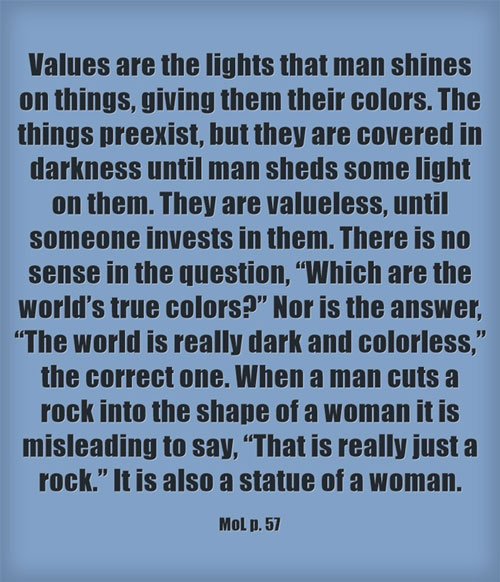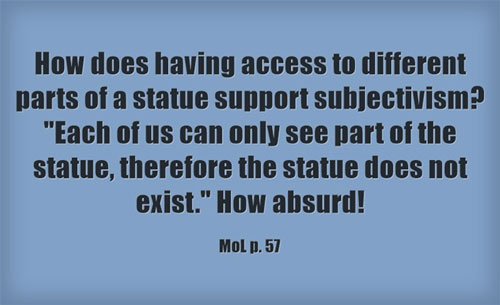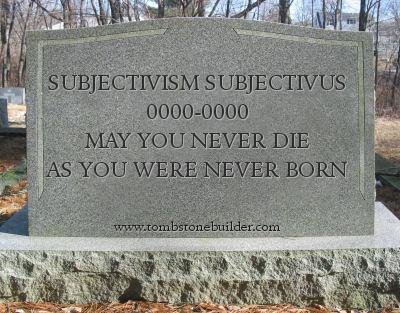SR
I wasn't one of them, but when most people embark on a study of philosophy, they start out as subjectivists. The condition is so prevalent (but treatable - most are cured within the first year) that it even got its own name: Student Relativism. Here, I present some of my own thoughts on the matter of subjectivism.
Defenestrate your terms (-Socrates)
The words "inherent" and "objective," though thought to merit distinct entries in the dictionary, are apparently treated as mere synonyms by some. It appears that a property cannot be objective if it is not inherent in the object. If the color red, for instance, is not inherent in the tomato, then red is somehow "subjective." Relations are thus effectively thrown out the window.

But why is it that an objective fact cannot result from a relation—the relation, say, between my retina and the light of the sun and the tomato? Perhaps, like a chemical reaction, something entirely new (and objective) is produced when these three elements are combined that was not there before (inherently) in either of the three elements. If I am right, then what is true of the inherent is not necessarily true of the objective. Specifically, the inherent can be absent where the objective is present. When I say, for instance, that an act is never inherently good or bad, I do not thereby mean that an act is never objectively good or bad! (See what I did there?)

'twas his son up there, you see.
Whence Cometh Good and Bad?
Good and bad come into existence along with beings. That does not mean they are illusions. No one says smoke—the result of the interaction of fire and wood—is an illusion, even if it is true that smoke is not inherent in the fire or in the wood. It is true that good and bad are not inherent in the action—but good and bad are still products of interactions, and are real and objective in that sense.

Made with quozio.
Seeing Men and a Wolf (Cf. Blind Men and an Elephant)
Imagine a circular room, like a very small Colosseum, with a centre that can be accessed through many doors all around its periphery. In the centre of this room there stands a statue, say that of the Capitoline Wolf. The statue is stationary: it does not revolve or move. Depending on which door you open, you will see a different part of the Capitoline Wolf: some will see its head, some its side, the less fortunate ones will be confronted with its rear. What you see depends on which door you open. Yet all see the same thing, the same object, the same statue: just different aspects of it.

Source: Wikipedia Commons
So it is with the world and values. We all perceive the same objects, actions, events—but we assign a different value to them. Sometimes our valuations more or less coincide, due to our shared nature as human beings. Other times, there is a significant discrepancy between our valuations: the death of a parent is acknowledged by all as an objective fact, but for the parent’s children this event will obviously have a much more profound and sad significance than for the generally indifferent public.

Made with quozio.
All-or-nothing thinking
According to the subjectivists, presumably, a slice of a bread is not real bread. Only a whole loaf is real bread; anything else is illusory. Furthermore, again according to the subjectivists, the whole bread is not the sum of its parts, but is rather the absence of them (—objective reality is not the addition of subjective points of view, but something contrary to them altogether).
Subjectivism is out of options
Subjectivism requires contradiction between views, otherwise we fall back to the Capitoline Wolf example, where all opinions are part of the objective truth. So here's the options:
If two points of view are contradictory, they cannot both be true. Subjectivism may be capable of a number of things, but violating the law of non-contradiction is not one of them. So one POV is true and the other is false.
If two points of view are both false, then they cannot be contradictory. In that case, eat, drink, and be merry, and don't worry about subjectivism: if you're wrong it means there's a right answer out there.
If two points of view are different, but not contradictory, then they can both be objective, as in the Capitoline Wolf example. Objective, you may remember from your high-school linguistics class (no?), is the opposite of subjective.

The curtain falls
This completes the 8th installment of the Meaning Of Life series. In case you missed the other episodes:
Part 7: The Value-Laden View of Life
Part 6: I Am Therefore I Harm
Part 5: Nietzsche vs Christianity: Are Christians Nihilists?
Part 4: Can we desire death?
Part 3: Are nihilists being honest when they say life has no value?
Part 2: Does death make life meaningless?
Part 1: Is it possible to be a nihilist?
I'll see you in the next episode, as yet untitled!


Come join us on Discord! https://discord.gg/7qyarFD
Attention readers! You can vote for me here to get me some delegated SP that I will use to promote @SteemDeepThink's authors. See here for a description of the contest. All earned monies will go to our group.
